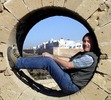Notes on my novel
My novel, "No Roads Lead to Rome," and planned sequels attempt to do for ancient times what "The Hitchhiker's Guide to the Galaxy" did for sci-fi. (I know this is a tall order, but why aim low?) Just as the future provides a great vantage point for us to examine the present, the distant past offered me a steamy window into modern times.
The broad brushstrokes of "No Roads" came to me while hiking with a friend in the hills outside of Barcelona. We were discussing--no--complaining about the decline and fall of damn near everything when it struck me that our conversation was older than the dirt we walked on.
I imagined two frustrated Roman legionaries having the same conversation 2000 years earlier while trudging along the same trail. I could almost an old centurion shouting, "The Emperor just doesn't get it! Slaves too expensive? What are those vexed Roman numeral crunchers thinking?"
The vision that hit me in a flash took another 5 years to extract and refine. Whenever I could, I wandered Europe and North Africa to tap the residual vibrations of the Roman Empire. From Hadrian's Wall across Northern England to the El Jem arena in Tunisia, I did a lot of research to bring the sights, smells, and sensations of ancient times to life.
When I learned that around 123 AD a slave had botched an attempt to kill the Emperor Hadrian in Tarraco--Tarragona, Spain-- the first line in the novel wrote itself.
"When it comes to assassination, execution is everything."
Two millennia later, why do we find the Romans so fascinating?
They were like the "Borg" from Star Trek; crushing resistance, assimilating everything in their path. They were great engineers and architects, deadly warriors, and brutally efficient administrators who built and managed the biggest empire the western world had ever seen. Romans considered themselves the only hope for humanity in the face of terror and barbarism.
From the early Republic to the late Empire, their world lasted a lot longer than much of ours has been around. That's worth a careful look.
The broad brushstrokes of "No Roads" came to me while hiking with a friend in the hills outside of Barcelona. We were discussing--no--complaining about the decline and fall of damn near everything when it struck me that our conversation was older than the dirt we walked on.
I imagined two frustrated Roman legionaries having the same conversation 2000 years earlier while trudging along the same trail. I could almost an old centurion shouting, "The Emperor just doesn't get it! Slaves too expensive? What are those vexed Roman numeral crunchers thinking?"
The vision that hit me in a flash took another 5 years to extract and refine. Whenever I could, I wandered Europe and North Africa to tap the residual vibrations of the Roman Empire. From Hadrian's Wall across Northern England to the El Jem arena in Tunisia, I did a lot of research to bring the sights, smells, and sensations of ancient times to life.
When I learned that around 123 AD a slave had botched an attempt to kill the Emperor Hadrian in Tarraco--Tarragona, Spain-- the first line in the novel wrote itself.
"When it comes to assassination, execution is everything."
Two millennia later, why do we find the Romans so fascinating?
They were like the "Borg" from Star Trek; crushing resistance, assimilating everything in their path. They were great engineers and architects, deadly warriors, and brutally efficient administrators who built and managed the biggest empire the western world had ever seen. Romans considered themselves the only hope for humanity in the face of terror and barbarism.
From the early Republic to the late Empire, their world lasted a lot longer than much of ours has been around. That's worth a careful look.
Published on December 09, 2010 07:54
•
Tags:
ancient-rome, historical-fiction, humor, sandwhich, writing
No comments have been added yet.



